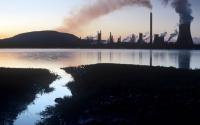27 January 2006News Scotsman
One of Britain's leading environmentalists will today sound a doomsday warning to the world: humanity's very existence is under threat from climate change and, even if we survive, the population will crash to about a third of its current level.
Sir Crispin Tickell, the man who convinced former prime minister Margaret Thatcher that global warming was a real problem, predicts that, in 200 years, there could be as few as 2.3 billion people because rising sea levels and temperatures will make some areas uninhabitable and, coupled with social factors, depress birth rates.
But he also says our survival is "not guaranteed" and that the presence of humans on the planet could be "no more than a somewhat messy episode in the history of the Earth".
Advances in genetics, he believes, could possibly result in the creation of different sub-species of humans, conjuring up the HG Wells nightmare of the Eloi and the Morlocks.
Sir Crispin, a former British ambassador to the United Nations who is now chancellor of Kent University and director of the Green College Centre for Environmental Policy and Understanding, is the third major figure in the field this month to sound a warning of massive changes in the years ahead. The others were James Lovelock,
who developed the Gaia theory of the planet as a living organism, and Chris Rapley, the director of the British Antarctic Survey.
Sir Crispin, who is due to give a lecture on this subject tonight, said:
"The human impact on the Earth has slowly and then rapidly increased, most of all in the last 250 years.
"The resulting transformation of the environment is unsustainable. The main factors are human population increase, degradation of land, consumption of resources, water pollution and supply, climate change, destruction of other species ...
"Most of the solutions to the problems we have created, including the widening division between rich and poor, are well known but few want to confront them, singly or together. To do so we have to rethink our value system."
He pointed to recent droughts in Mediterranean countries and the increasing severity of hurricanes in the Caribbean - caused by a rise in sea temperature - as some of the signs that global warming is starting to get out of hand.
Sir Crispin has tried to forecast what is in store for humanity "supposing we can cope with the natural hazards" over the next two centuries.
But he warned: "Our survival in one form or another is not guaranteed."
If humanity survives, what could emerge will be far removed from the US-dominated world of today. "We will find the hubs of power, wealth and culture are very different with a greatly reduced human population," Sir Crispin said.
"Sea levels will rise, meaning coastlines will be different.
"I don't think climate change by itself is going to do anything [politically], but it is one of a number of factors that will alter the balance of power."
There are about 6.3 billion people on the planet and this is predicted to rise to nine billion this century.
"I think we just cannot go on like that. Perhaps the ideal number would be 2.3 billion," he said. "Population growth has now stopped in parts of the world. Other parts are going to be affected by climate change. People's propensity to breed will be much less."
Perhaps his most startling claim is that geneticists may in the future create different types of humans to do different tasks.
"All I mean is we could genetically improve people. That's one of the possibilities," Sir Crispin said. "It's like the HG Wells nightmare of the Eloi and the Morlocks. I'm not saying it's going to happen [but] we might have different varieties or sub-species of humans."
'Change travel habits or ruin air quality'
BRITONS must face a big shake-up in their travel behaviour or risk having the air they breathe dangerously and irreversibly polluted within 15 years, a report warns today.
It calls for more cycling and walking, greater use of public transport, a boost for home-working, more local facilities to reduce journey lengths and incentives to use eco-friendly cars.
The report, by the University College London Bartlet School of Planning and the Halcrow Group, was commissioned by the Department for Transport.
Professor David Banister of the Bartlet school, said: "For governments not to act is becoming increasingly irresponsible. We need major change in the way people travel."
The report said there were 370 parts per million of carbon dioxide in the atmosphere and this was growing at two parts per million towards the danger level of 400, giving 15 years to turn this around. It found changing lifestyles and travel patterns was more effective than concentrating on technological advances such as alternative fuels.
Meanwhile, Australian scientists have warned global warming would cause sea levels to rise by up to 34cm by the end of the century.






